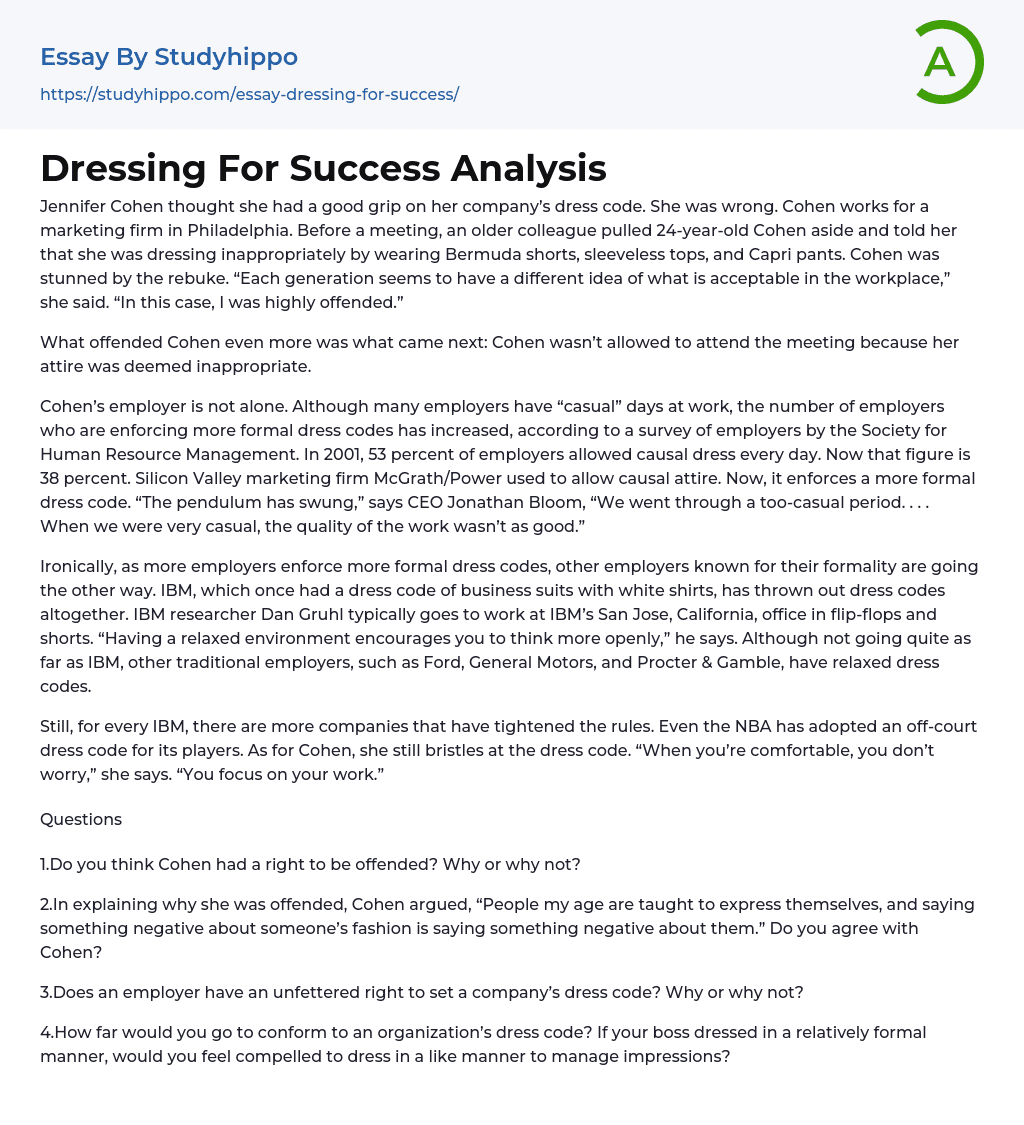Jennifer Cohen thought she had a good grip on her company’s dress code. She was wrong. Cohen works for a marketing firm in Philadelphia. Before a meeting, an older colleague pulled 24-year-old Cohen aside and told her that she was dressing inappropriately by wearing Bermuda shorts, sleeveless tops, and Capri pants. Cohen was stunned by the rebuke. “Each generation seems to have a different idea of what is acceptable in the workplace,” she said. “In this case, I was highly offended.”
What offended Cohen even more was what came next: Cohen wasn’t allowed to attend the meeting because her attire was deemed inappropriate.
Cohen’s employer is not alone. Although many employers have “casual” days at work, the number of employers who are enforcing more formal dress codes has incr
...eased, according to a survey of employers by the Society for Human Resource Management. In 2001, 53 percent of employers allowed causal dress every day. Now that figure is 38 percent. Silicon Valley marketing firm McGrath/Power used to allow causal attire. Now, it enforces a more formal dress code. “The pendulum has swung,” says CEO Jonathan Bloom, “We went through a too-casual period. . . . When we were very casual, the quality of the work wasn’t as good.”
Ironically, as more employers enforce more formal dress codes, other employers known for their formality are going the other way. IBM, which once had a dress code of business suits with white shirts, has thrown out dress codes altogether. IBM researcher Dan Gruhl typically goes to work at IBM’s San Jose, California, office in flip-flops and shorts. “Having a relaxed environment encourages yo
to think more openly,” he says. Although not going quite as far as IBM, other traditional employers, such as Ford, General Motors, and Procter & Gamble, have relaxed dress codes.
Still, for every IBM, there are more companies that have tightened the rules. Even the NBA has adopted an off-court dress code for its players. As for Cohen, she still bristles at the dress code. “When you’re comfortable, you don’t worry,” she says. “You focus on your work.”
Questions
1.Do you think Cohen had a right to be offended? Why or why not?
2.In explaining why she was offended, Cohen argued, “People my age are taught to express themselves, and saying something negative about someone’s fashion is saying something negative about them.” Do you agree with Cohen?
3.Does an employer have an unfettered right to set a company’s dress code? Why or why not?
4.How far would you go to conform to an organization’s dress code? If your boss dressed in a relatively formal manner, would you feel compelled to dress in a like manner to manage impressions?
- Jeans essays
- Clothing essays
- Cosmetic Surgery essays
- Fashion design essays
- Footwear essays
- Code of Ethics essays
- Conflict essays
- Dress Code essays
- Human Resources essays
- Organizational Behavior essays
- Performance essays
- Recruitment essays
- Safety essays
- Accident essays
- Awareness essays
- Benefits of Volunteering essays
- Challenges essays
- Childhood Memories essays
- Decision essays
- Driving essays
- Event essays
- Excellence essays
- Expectations essays
- Failure essays
- Farewell essays
- Flight essays
- Gift essays
- Growing Up essays
- Ignorance essays
- Improve essays
- Incident essays
- Knowledge essays
- Luck essays
- Memories essays
- Mistake essays
- Obstacles essays
- Overcoming Challenges essays
- Party essays
- Peace Corps essays
- Personal Experience essays
- Problems essays
- Sacrifices essays
- Struggle essays
- Success essays
- Trust essays
- Vacation essays
- Visit essays
- Volunteering essays




